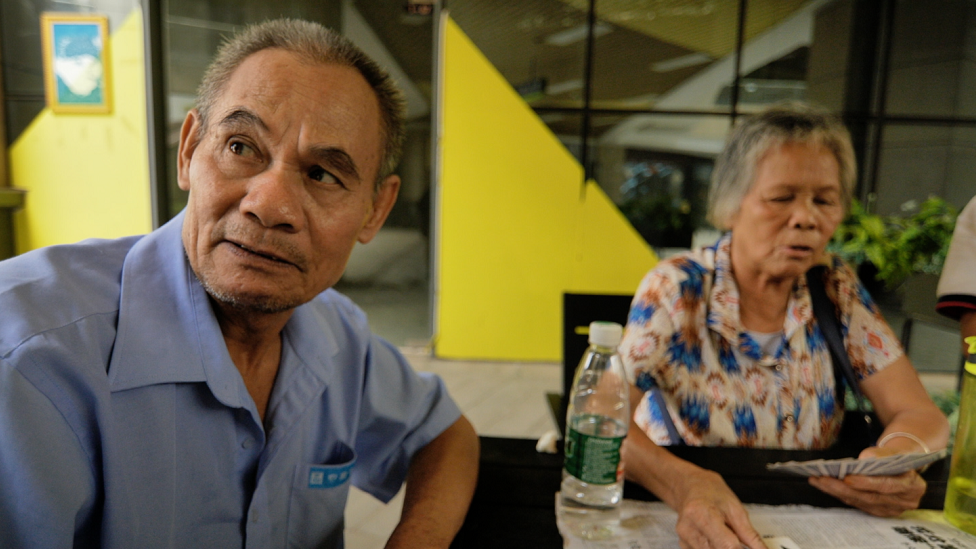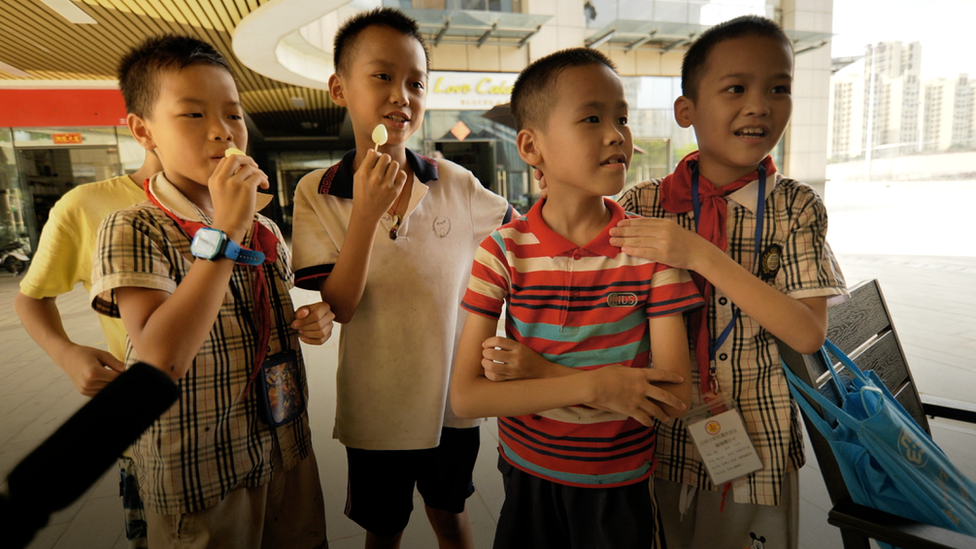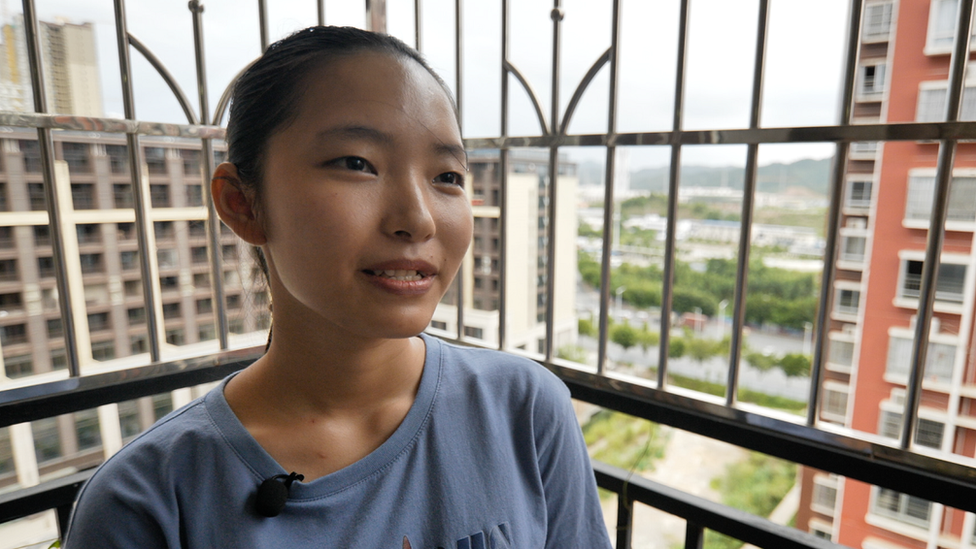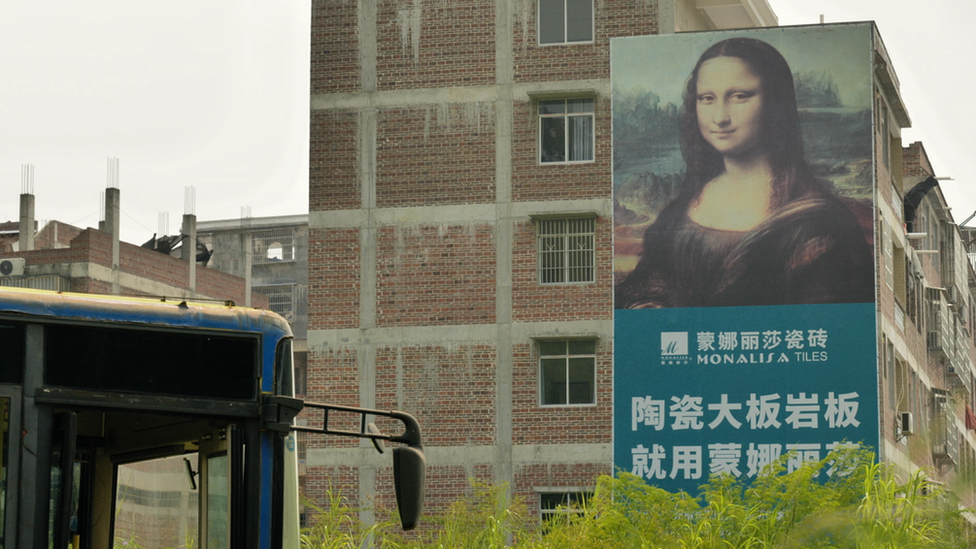Climate change: Tracking China's steel addiction in one city
- Published
Inside Wuzhou: "We are surrounded by construction... but new apartment blocks are half empty"
Wuzhou, in southern China, is a living example of the country's dependence on its "build, build, build" mantra to boost development. It was one of many contributors to China's record output of a staggering one billion tonnes of steel last year.
But increasingly, cities like this are having to grapple with China's climate change goals and the big question: will it cut emissions quickly enough?
"No, it (the development) won't stop."
The grandpa, playing cards with two friends in his blue shirt, was adamant. I was standing next to him in a corner of a recently constructed but mostly empty shopping mall. "Ten years ago... this was just barren mountains and ridges. It's developed so well."
The 68-year-old insisted that the environment and water were all good. "Everything is nice, especially the people. Everyone is happy."
As we talked, his grandson played with a few friends in the centre of the mall. With red Communist Party scarves tied around their necks, they were building walls with multi-coloured foam blocks. The "build" mantra is in their blood.
"My dad's job is building houses," one shouted out. "He drives a crane to lift things up, so other construction workers can have the materials to build houses."

Many of Wuzhou's residents don't think it should slow down its construction and industry
In the post-Covid economic freeze, Beijing did what it usually does: spend big on infrastructure and building to heat up the economy. Steel is an integral part of that and also a major industry in Wuzhou, which has generated lots of new jobs - as well as a lot of pollution.
China has the highest carbon emissions in the world and steel is its second most polluting industry after coal.
Steel has underpinned China's rise.
The vast industry that now dominates the global steel trade created a huge number of jobs for workers who produce the rods that hold up millions of buildings and bridges, as well as the chassis and sheets that make millions of cars.

The COP26 global climate summit in Glasgow in November is seen as crucial if climate change is to be brought under control. Almost 200 countries are being asked for their plans to cut emissions, and it could lead to major changes to our everyday lives.

In many ways, the rise of steel can be directly linked to increasing modernisation, urbanisation and the rising aspirations of China's population.
Wuzhou is a small city - by China's standards - with a population of around three million.
The BBC asked several steel companies if we could have access to their facilities and interview senior staff in Wuzhou, but they all refused.
However, you can see the construction everywhere. You see the clusters of cranes. You hear the trucks. All of it evidence of a country that's still shifting its people to the cities.
But amid mounting pressure on climate targets, like many other cities it is trying to slow down.

The 'build' mantra is in the blood of many of Wuzhou's residents
Last month Wuzhou authorities ordered six steel mills to reduce production, to try to hit energy consumption and emissions targets. Workers we spoke to near one plant confirmed they were temporarily on reduced working hours.
It's a snapshot though, not the whole picture.
China is expected to keep increasing its demand for coal until 2026. It's expected to increase its carbon emissions annually until 2030.
After that, it has committed to reducing emissions gradually for another 39 years until 2060, by which time it aims to go net-zero on carbon emissions.
In fact The Carbon Brief, a respected climate science website, said that companies in China's two largest carbon-emitting sectors - power and iron and steel - "have continued to announce new investments in coal-based capacity, pointing to a continued mismatch with the country's emissions goals".

COP26 climate summit - The basics
Climate change is one of the world's most pressing problems. Governments must promise more ambitious cuts in warming gases if we are to prevent greater global temperature rises.
The summit in Glasgow is where change could happen. You need to watch for the promises made by the world's biggest polluters, like the US and China, and whether poorer countries are getting the support they need.
All our lives will change. Decisions made here could impact our jobs, how we heat our homes, what we eat and how we travel.

Analysis from the Centre for Research on Energy and Clean Air seen by the BBC indicates that "a total of 18 new blast furnace projects... and 43 new coal-fired power plant units were announced."
And even Wuzhou might be trying to ease off the relentless construction but it doesn't look like a city that's slowing down.
Many of its residents like first-time home buyer Zhong Xin, 19, also see no need to slow down.
"They are building a lot of apartments here but also they will grow green plants," she says, adding that "if they don't build buildings there the land will be wasted and the green landscape won't look good".
Home for her is an apartment that sits on the 13th floor of a tower block that was completed a few years ago. She and her boyfriend saved and borrowed from a bank to buy the place together.

First time home buyers like this are too busy to pay attention to issues like the climate
As we chatted on her balcony, with her ginger kitten at my feet, I asked her what she knew about climate change and how China's pollution compared to the rest of the world.
"I'm quite busy at work so I don't really follow it. Sorry," she said.
She is indeed busy. She has two jobs and a mortgage, living what China's leader Xi Jinping has called the "China dream" - the ruling Communist Party's ambition of a rapidly modernised nation and a moderately prosperous society.
But now it's under pressure to make that dream a much cleaner one.
Mr Zhong, who works as a real estate agent, is another person who doesn't see any need for China to slow down because of what he views as "wild accusations" from the US.
Timing is the key issue. China will slow down, he said, when it's ready.
"I think the US is not friendly to China. What we are doing is no-one else's business. I suppose we should just ignore the wild accusations from the US and focus on developing ourselves, right?"
But he is also a realist. China's "build, build, build" attitude could be a problem for him and his trade.
"The whole industry is very sluggish," he told me. "Because most of Wuzhou's people are leaving the city and the younger generation don't really want babies, right? So the need for homes is not that big anymore."
Construction does often mean emptiness in China, with overcapacity an issue in many of its cities where many tower blocks and shops stand without any residents.
China has often built because it's often the simplest way to spur on the economy. But it's also driven by the fact that tax from land sales has long been the established way to raise money for local governments.
President Biden's climate envoy John Kerry has been to China twice in recent months to try to hammer out an agreement between the world's two biggest economies, on measures to cut carbon emissions.
He told me and a handful of others that China "can do more".

Construction may not have made China more beautiful, but its citizens believe it has made life 'better'
It doesn't have to do what the US is doing, he said, but it should be "sufficient to your own capacities". In short, he thinks China has to reduce its reliance on coal, increase its energy mix and cut its carbon emissions faster. Otherwise, it could wipe out the efforts of numerous smaller nations.
What China finally decides to do about emissions will be a balance between its domestic demands and its growing global obligations.
Climate specialist Shu Wang, from global consultants firm ICF, put it like this: "In my conversations with some local governments they are quite concerned about how to achieve the requirements of the (central) government on carbon emission reduction, while also realising the original economic growth, because they are facing quite big pressure to maintain GDP growth every year."
As we drove from an area of steel mills back into Wuzhou city centre I saw an incongruously beautiful poster on a brick apartment block - a massive copy of the Mona Lisa.
The "build, build, build" mantra might not have made China more beautiful, but the people who talked to us were clear: it has made this country "better".
The Communist Party leaders now have to work out how to keep this powerhouse economy growing, and stick to their promise of creating a richer country, while also having to fast-track making it greener.
Related topics
- Published30 September 2021
